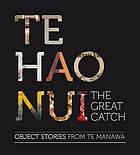Difference between revisions of "Te Hao Nui: The Great Catch"
| Line 1: | Line 1: | ||
| − | |||
== Te Hao Nui: The Great Catch - Object Stories from Te Manawa == | == Te Hao Nui: The Great Catch - Object Stories from Te Manawa == | ||
| Line 25: | Line 24: | ||
photos from various sources. Te Hao Nui brings the objects found on its pages to life, telling us not only about | photos from various sources. Te Hao Nui brings the objects found on its pages to life, telling us not only about | ||
what it means to be a New Zealander, but howwe have come to be this way. The book’s high production values and bold design make it a treasure as beautiful as the objects it contains. | what it means to be a New Zealander, but howwe have come to be this way. The book’s high production values and bold design make it a treasure as beautiful as the objects it contains. | ||
| + | |||
| + | ---- | ||
| + | |||
| + | There is a review [[http://www.stuff.co.nz/manawatu-standard/features/arts-on-friday/6075027/Here-there-and-now here]]. | ||
[[Category:2011_Books]] | [[Category:2011_Books]] | ||
Revision as of 01:35, 8 June 2012
Te Hao Nui: The Great Catch - Object Stories from Te Manawa
Fiona McKergow, Kerry Taylor 2011 Random House, Auckland, N.Z. ISBN 9781869797188 1869797183
The Blurb:
From the clumsy industrial design of an early portable computer and a delightfully crafty pine-needle tea set made for the New Zealand Centennial Exhibition to a fragile kahu kiwi and the intricately built optometric Refractor Head, a new book celebrating the collection of Te Manawa Museum provides a fascinating insight into the Manawatu region and our broader national history.
Te Hao Nui: The Great Catch, to be released in December, is a visually stunning and textually fascinating collection of the treasures held within New Zealand’s only regional museum to weave together the three disciplines of history, art and science: Te Manawa. Museum collections are a treasure trove of objects, each with the capacity to tell a compelling story or stories. Many objects in Te Manawa’s collection speak of a deep curiosity for the world ‘out there and beyond’, while others evoke an intense sense of belonging to the Manawatu, with many of the objects in the book introduced with the name of the local resident it once belonged to, such as ‘Joyce McKelvie’s Queen Carnival Costume’. Te Hao Nui features a diverse and impressive list of contributors from a range of backgrounds and fields, including leading historians, curators, and Maori scholars, as well as descendents of the people who donated the objects, and informative text that delves far deeper than providing mere captions for the objects.
The striking photography is by Te Papa photopgrapher Michael Hall, supplemented by fascinating archival photos from various sources. Te Hao Nui brings the objects found on its pages to life, telling us not only about what it means to be a New Zealander, but howwe have come to be this way. The book’s high production values and bold design make it a treasure as beautiful as the objects it contains.
There is a review [here].
